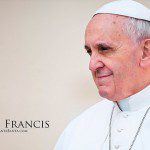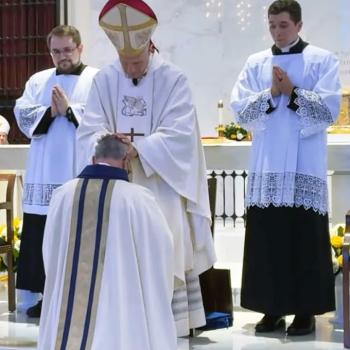(long pause)
If there is one!
Johanna: Well, I think the idea that the nature of sex can be procreative and unitive -- and I'm going to take the liberty to expand procreative to a larger meaning than sperm plus egg to include the idea that sexuality or that sexual acts that come from a place of love and mutuality have the power to bring two people closer together and also to create something new, whether it's a child or a relationship that can sustain a family, or help sustain each other for the work that they do for justice, or in their communities, or in their faith communities -- I think there's something really beautiful and really sacred about that. The idea that a sexual act isn't just an act devoid of meaning -- it's something that brings two people together but also can create something more.
Jessica: My instinct to answer this question is to talk about Catholic teaching more generally, and I think that one thing that I appreciate about Catholicism, particularly Catholic practice, is how bodily it is. And while I think any teachings on sexual ethics can be seen as sort of coloring the body in negative lights -- and surely there are many Catholic practices that can be deemed harmful to the body -- I think in general just how even in the regular weekly liturgy our bodies are so much a part of how we worship God. To me, that has been a really fruitful reality for thinking about sexuality for myself in broader terms, beyond just these teachings that we usually hear about.
Kate: I had some similar thoughts to yours, Jessica. I think the thing that I love the most about Catholic theology in general is the idea that embodiment is sacred, that in God becoming embodied, our bodies are caught up in this Divine-ness. And then coupling that with the teaching of the Mystical Body of Christ -- that our bodies are somehow also caught up with each other in this crazy mystical web that's not just a spiritual thing, we're not just spiritually linked to each other, but we're actually physically linked in some way. It opens up all sorts of possibilities for thinking about how the ways that we use our bodies relate to the other things that we do in the world, and how anything that we do with our bodies is not just about our bodies, but is also related to the Divine -- it has implications for our spiritual life -- but then also that it has implications for the ways that our bodies are related to other bodies as well. I can envision a sound, just, and mutual sexual relationship being beneficial to the body of Christ in general. Unjust uses of sexuality are hurtful to other bodies, and not just the bodies that are being used unjustly, but to all of us as well. This gives an urgency and importance to everything that is done with our bodies that I think is just so... it's just so crazy to think about! It really expands, or can expand, your thinking of what the potential is in terms of the things that our bodies do, and how bodies can be tools for justice.
For a complete transcript of this conversation, visit From the Pews at the Back blog.
Kate Henley Averett, 28, received a B.A. in religion from Mount Holyoke College in 2004 and a M.Div. from Harvard Divinity School in 2008. Kate will begin work toward a doctoral degree in Sociology at the University of Texas at Austin this fall, where she will focus on the study of gender and sexuality in religion and education.
Jessica Coblentz, 23, graduated from Santa Clara University in 2008 with a double major in Religious Studies and Women's & Gender Studies. There, she served as a Hackworth Research Fellow at the Markkula Center for Applied Ethics, where she conducted research on religion and sexual ethics. She is currently a first year student at Harvard Divinity School where she is pursuing a Master of Theological Studies degree with a focus in "Women, Gender, Sexuality, and Religion."
Johanna Hatch, 27, is a feminist activist, Catholic, writer, spouse, and mother currently residing in Verona, WI. Trying to reconcile these converging identities compels her to speak out on issues of sexuality, gender, and religion. Johanna is graduated from the College of St. Benedict in 2005 and studied spirituality at the graduate level at Washington Theological Union.




